Ever wondered why bamboo is favored in construction? Did you know it rivals the strength of steel? Let’s delve into the surprising might of this versatile wood!
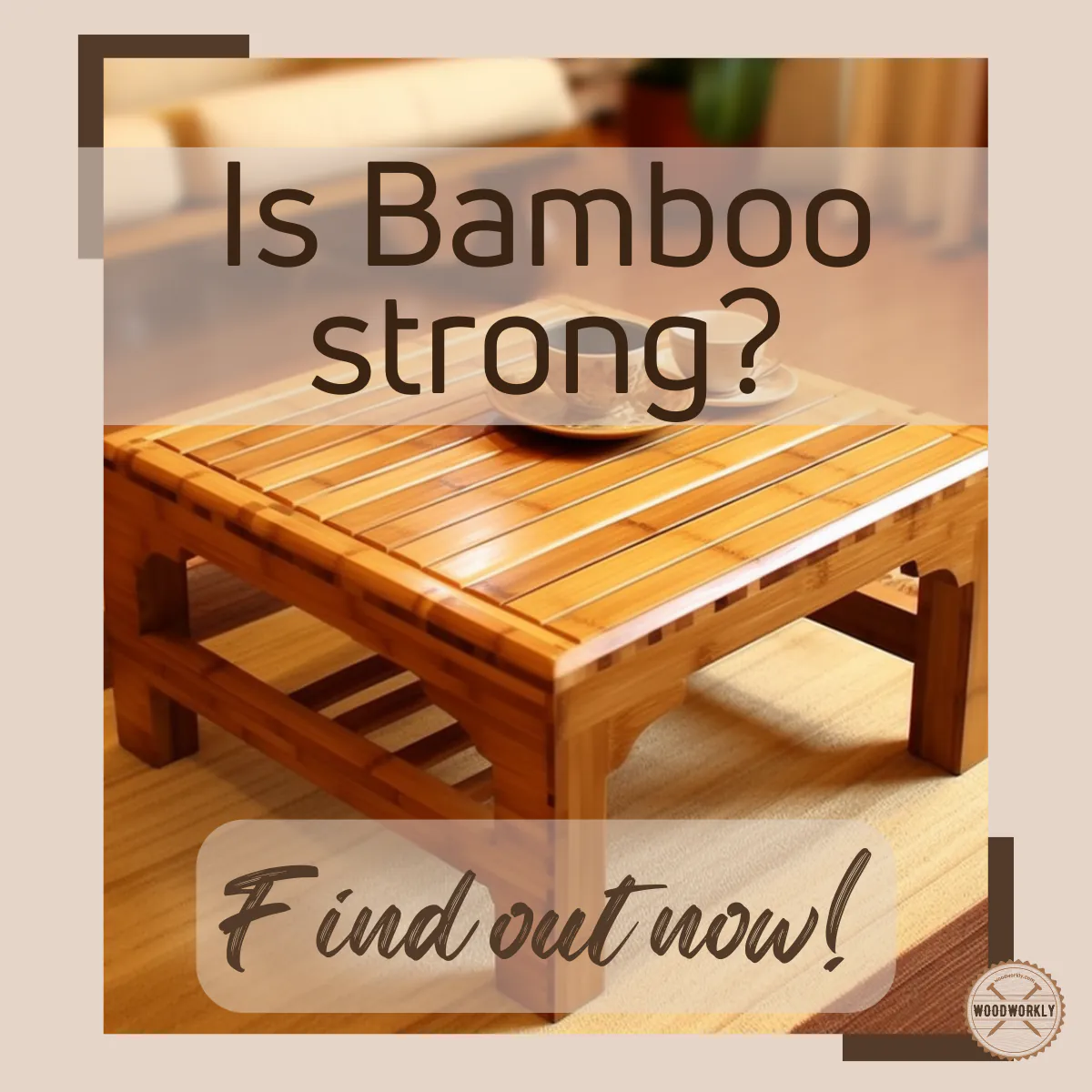
Bamboo is a popular wood in furniture making, fabrics, building materials, and many other woodworking projects.
It is a lightweight and fast-growing tree with lots of unique qualities.
When I was working with Bamboo, I was curious about the strength of Bamboo and did deep research to identify how strong it is with the help of other experts.
Now years after working with Bamboo for many projects, Here’s what I know about, Is Bamboo strong?
Yes, bamboo is extremely strong. It has a tensile strength of 28,000 pounds per square inch, surpassing steel. Moreover, it’s 2-3 times harder and stronger than most hardwoods, like oak. Its impressive strength-to-weight ratio also makes it ideal for construction and reinforcement purposes.
But that’s just a quick snapshot and there’s a lot more to know.
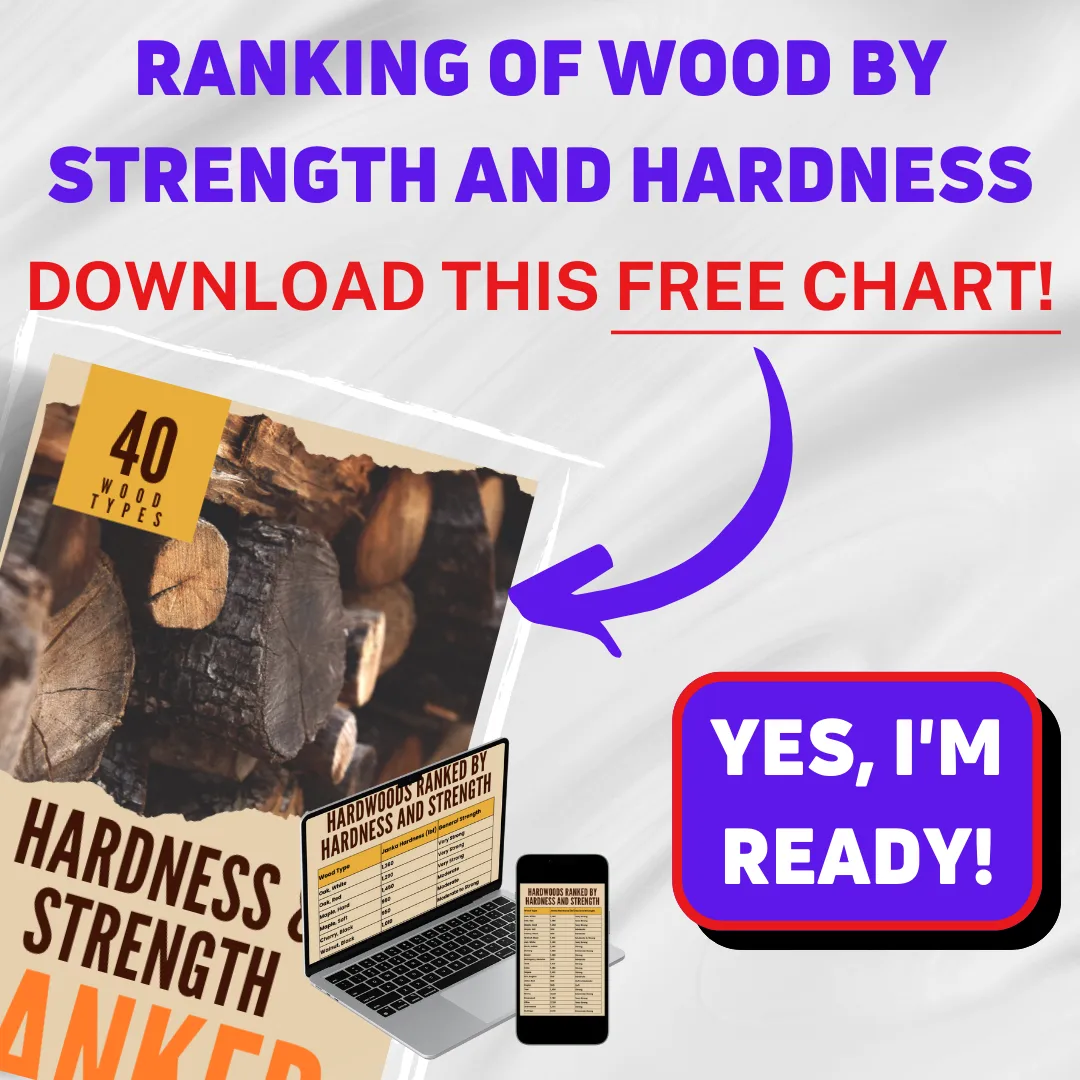
So, in this article I’ll explore is Bamboo strong, how strong is Bamboo, is Bamboo strong for furniture, flooring, and cutting boards.
Furthermore, I’ll answer some frequently asked questions as well.
So, let’s jump in!
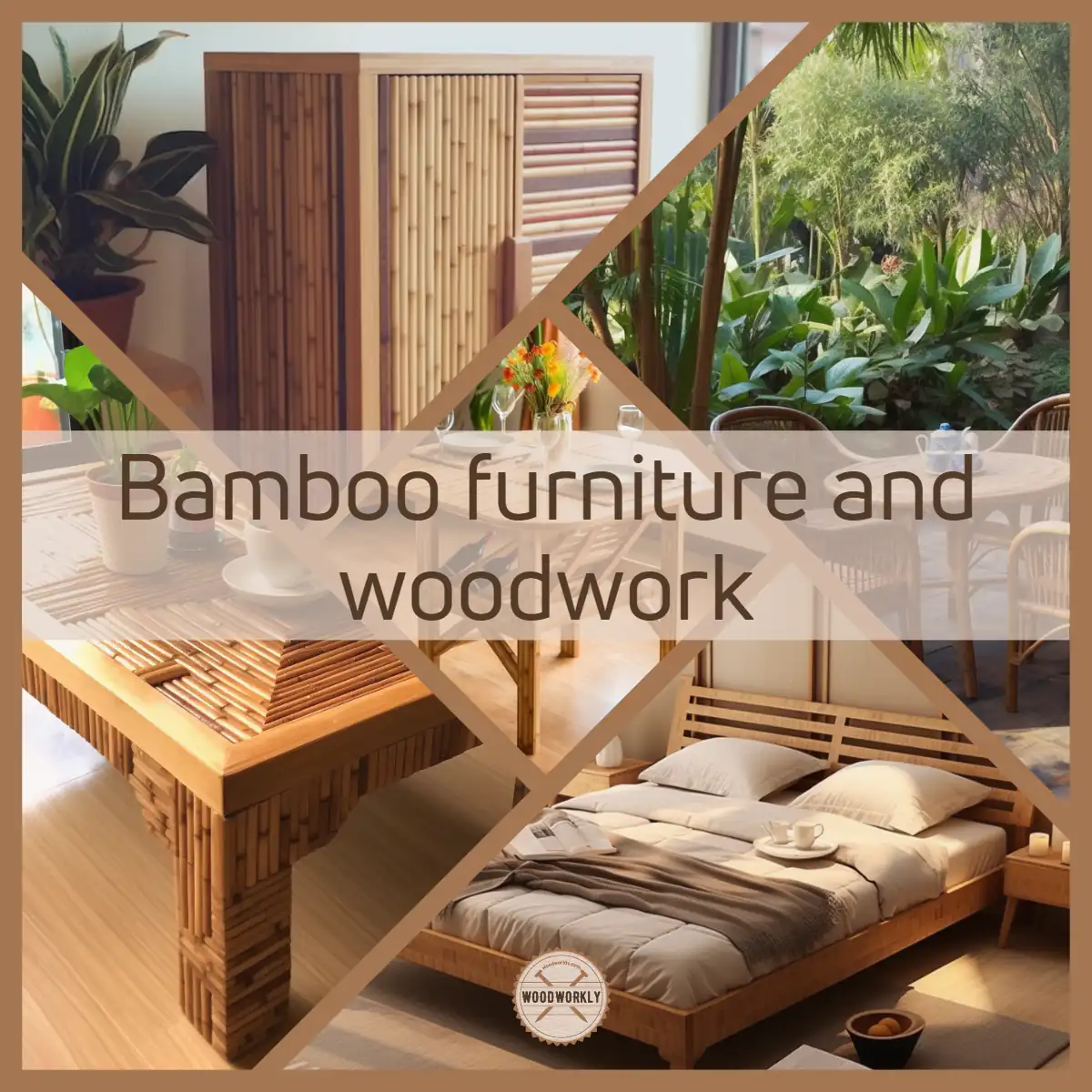
How Strong Is Bamboo?
Bamboo is stronger than most softwoods and some hardwoods as well. It is hardwood with great structural properties.
The strength of Bamboo depends on the following factors.
They are,
- Compressive strength
- Tensile strength
- Density
- Stiffness
- Hardness
So, let’s have a look at the values of Bamboo for the above factors to know how strong Bamboo is.
| Compressive Strength | 19.96 Mpa – 23.80 Mpa |
| Tensile Strength | 142 Mpa – 265 Mpa |
| Density | 500 kg/m3 – 800 kg/m3 |
| Stiffness | 5 – 25 Gpa |
| Hardness | 1,300 lbf – 1,400 lbf |
As you can see, the compressive strength and tensile strength of Bamboo are significantly high. Bamboo is naturally created for its strength because of its unique composition.
There are no knots or rays that can be seen in Bamboo wood. therefore, it can withstand high stress along the length of the stalk.
When we look at the fiber structure of Bamboo, its sectional anatomy and cane enhance its structural integrity.
Because of having different chemicals, Bamboo is great for gluing, and because of having high silica content, it gives termites a hard time digesting.
Because of the above unique qualities Bamboo is strong and considered a wood with high durability in many woodworking projects.
There are over 1600 species of Bamboo. Overall Bamboo is strong, more durable, and sustainable building material than most other woods.
Here are the factors that prove Bamboo is stronger than other popular woods,
- Bamboo is 38% stronger than Douglas fir
- Bamboo is 109% stronger than White Pine
- Bamboo is stiffer than White Pine
Here’re the pros and cons of Bamboo to get an idea about how strong it is.
| Pros | Cons |
| Dense cell structure | Susceptible to deterioration |
| Versatile | Different quality variations |
| Durable and strong | Hard to handle |
| Fast-growing | High cost |
| Easy installation | |
| Water resistance |
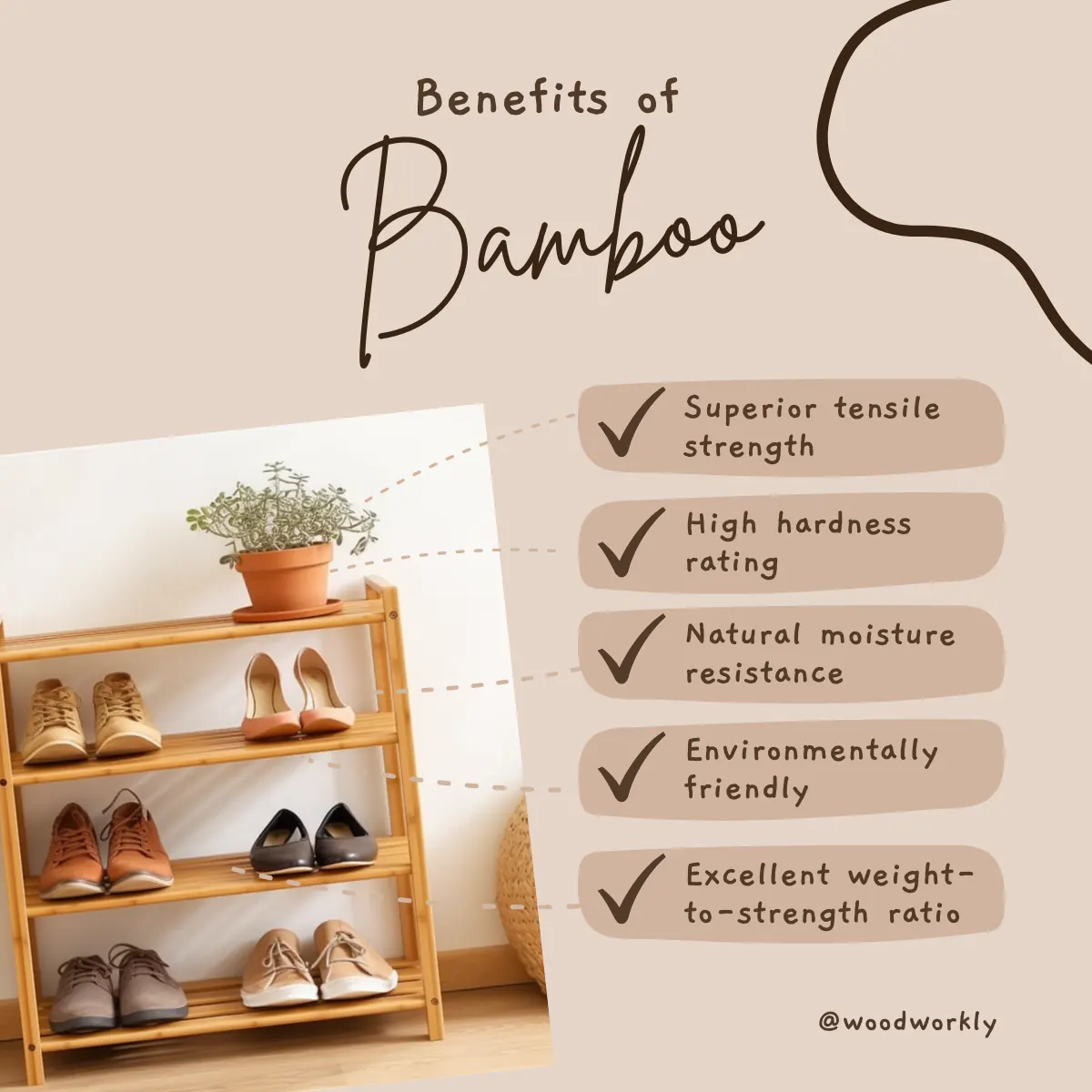
Strength Of Bamboo
When we think of strong materials, our minds often jump to the likes of steel and concrete, largely used in construction.
But have you ever considered bamboo? This versatile, eco-friendly plant outshines many traditional materials in various ways.
In fact, the strength of bamboo can quite literally bend the imagination. Let’s dive deeper into understanding its remarkable strength.
The Advantage of Weight-to-Strength Ratio
When evaluating materials for construction or reinforcement, the weight-to-strength ratio is crucial.
And this is another area where bamboo shines. Steel, despite its strength, is considerably heavier than bamboo.
Therefore, when you’re seeking a material that offers strength without the added bulk, bamboo steps up to the plate.
This makes it an exceptional choice for applications requiring a high strength-to-weight ratio.
Harder Than Most Hardwoods
Think of hardwoods, and you’ll likely imagine sturdy oak or mahogany.
However, you may be surprised to learn that bamboo is actually 2-3 times harder and stronger than most hardwoods, including oak.
This makes it a fabulous choice for products like flooring or furniture, where durability and longevity are key.
Bamboo in Practice: Real-Life Applications
The strength of bamboo isn’t just theoretical—it has real-world applications.
Bamboo’s strength, combined with its flexibility and sustainability, has made it a material of choice in many areas.
For instance, Bamboo is widely used in construction, particularly in areas prone to earthquakes, as its flexibility allows it to sway with the ground movement rather than cracking or breaking.
Additionally, you can find bamboo in bicycle frames, flooring, and even in the culinary world as cutting boards, owing to its incredible hardness.
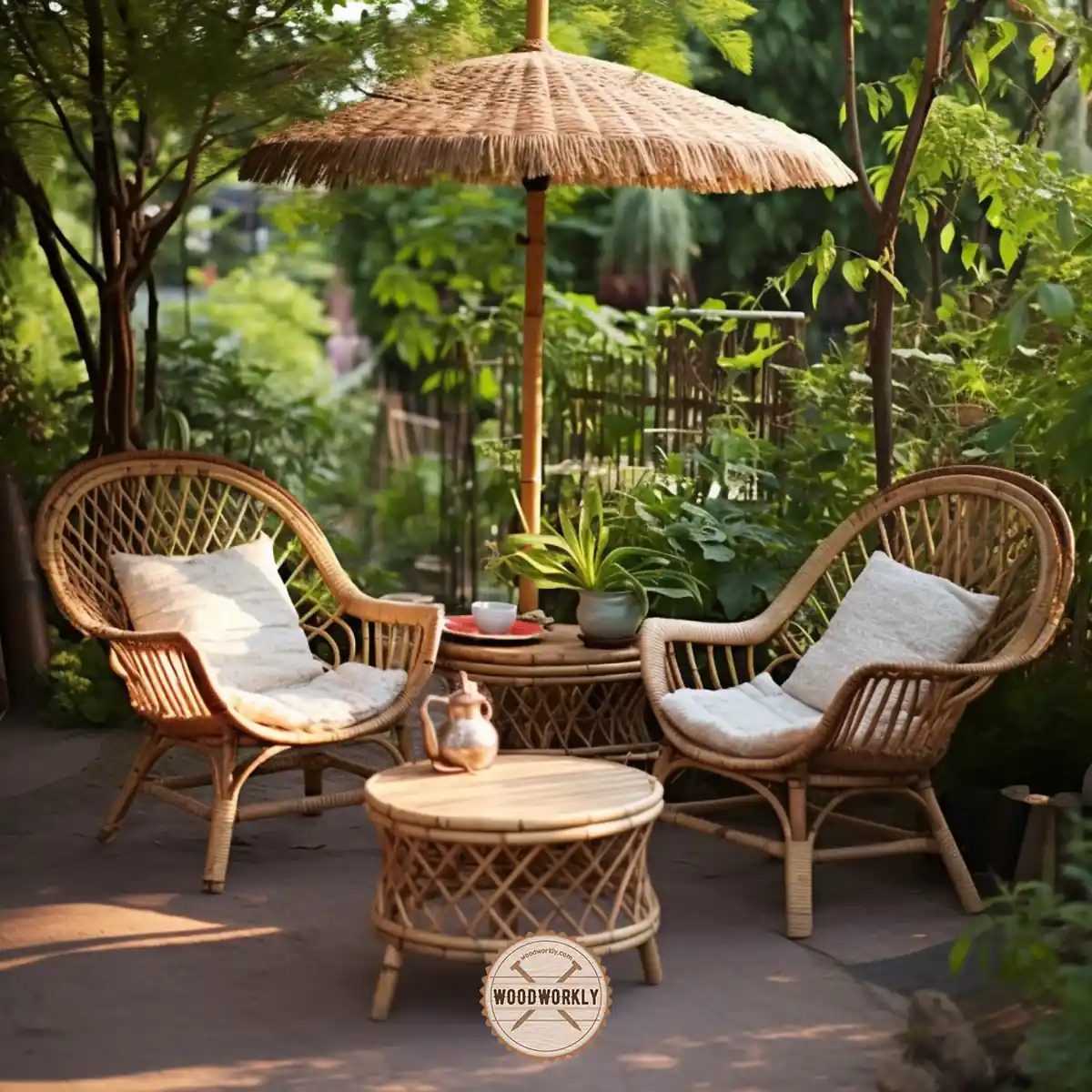
Is Bamboo Strong for Furniture?
Yes, Bamboo is strong for furniture making.
It has great compressive strength, bending strength, density, and stiffness that make strong and durable furniture than lasts over decades with proper care.
Bamboo can easily use for both indoor and outdoor furniture making because of its high dimensional stability and hardness.
It is available as panels or planks. The dense fiber of Bamboo gives good flexural strength to the furniture.
As a woodworker, when it comes to strength, I highly recommend using Bamboo over any other wood.
Because some species of Bamboo are harder than metal and concrete due to their naturally designed strength.
Here’re some furniture applications you can build with Bamboo with superior strength.
- Coffee table
- Storage cabinet
- Shoe rack
- Folding chairs
- Nightstand
- Sofa table
- Benches
- Outdoor patio
- Bed frames and bases
Bamboo can use as a house-building material as well. It is strong enough to use as skyscraper for vertical construction.
The best bamboo that use for house construction are Bambusa, Phyllostachys, and Dendrocalamus.
Bamboo is a versatile, renewable, and sustainable wood with extreme durability.
Houses made with Bamboo last for 10 – 12 years without a single repairment. After a little repairing, those houses will last forever.
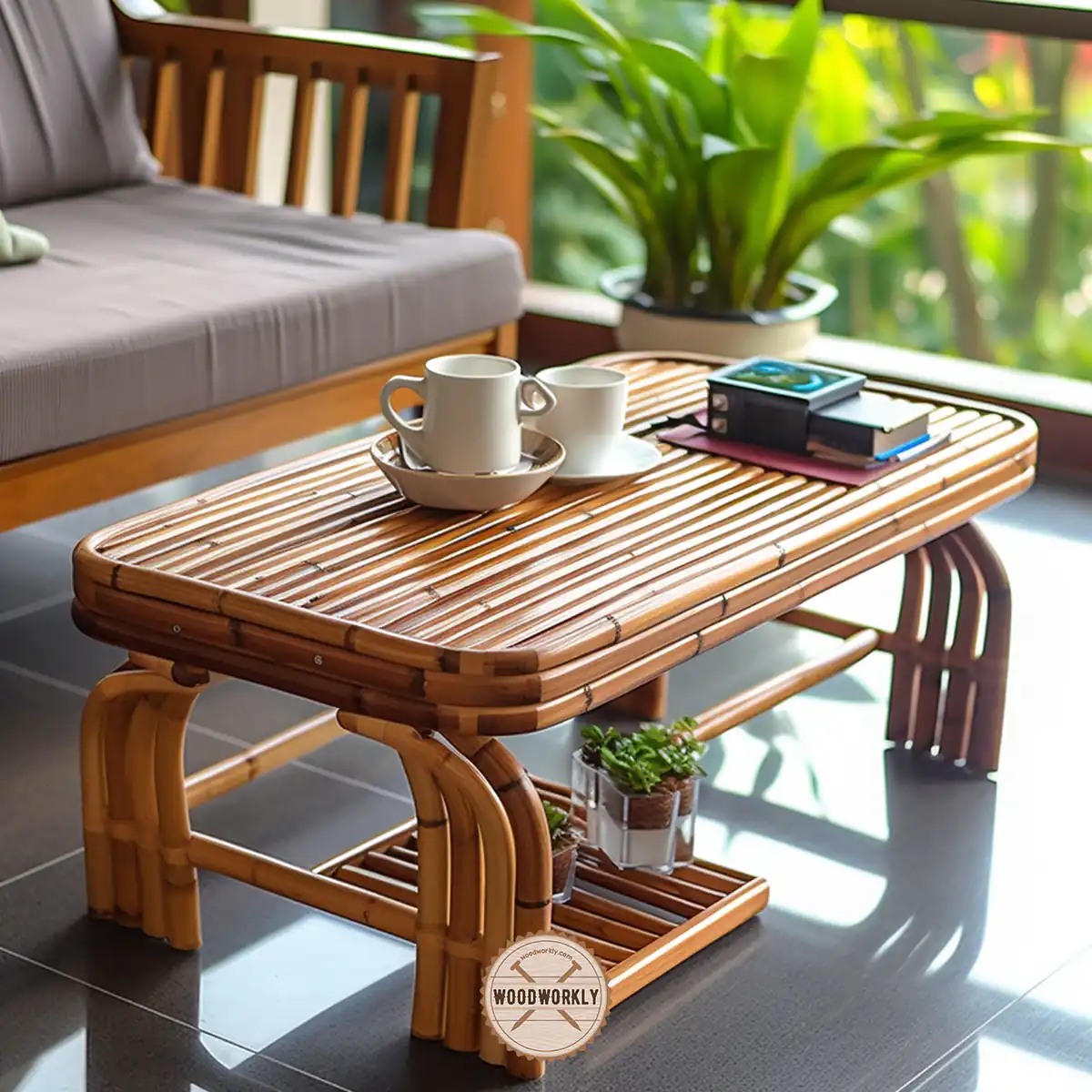
Is Bamboo Strong for Flooring?
Yes, Bamboo is strong for flooring. It has good structural integrity which is resistant to dents and scratches.
It can withstand foot traffic and work well as a flooring material.
Bamboo has a dense cell structure, and Bamboo has good water resistance. But it’s not waterproof and better to wipe off immediately before spills stand on the surface for too long.
To increase the durability of the floor better to apply sealer.
Urethane sealer protects the Bamboo flooring from water, discoloration, and warping. Plus, urethane-coated Bamboo floors are easy to clean.
When it comes to flooring, Bamboo is not the strongest wood, but it’s stronger, harder, and denser than many other popular kinds of wood that are generally used for flooring applications. Bamboo is 2-3 times stronger than timber.
In summary here’s why Bamboo is great for flooring,
- Water-resistant
- Easier on legs
- Dent and scratch-resistant
- High durability
- Strong
- Hard
- Dense
- Lightweight
- Easy to clean
Under is Bamboo strong, let’s find out can we use it for cutting boards,
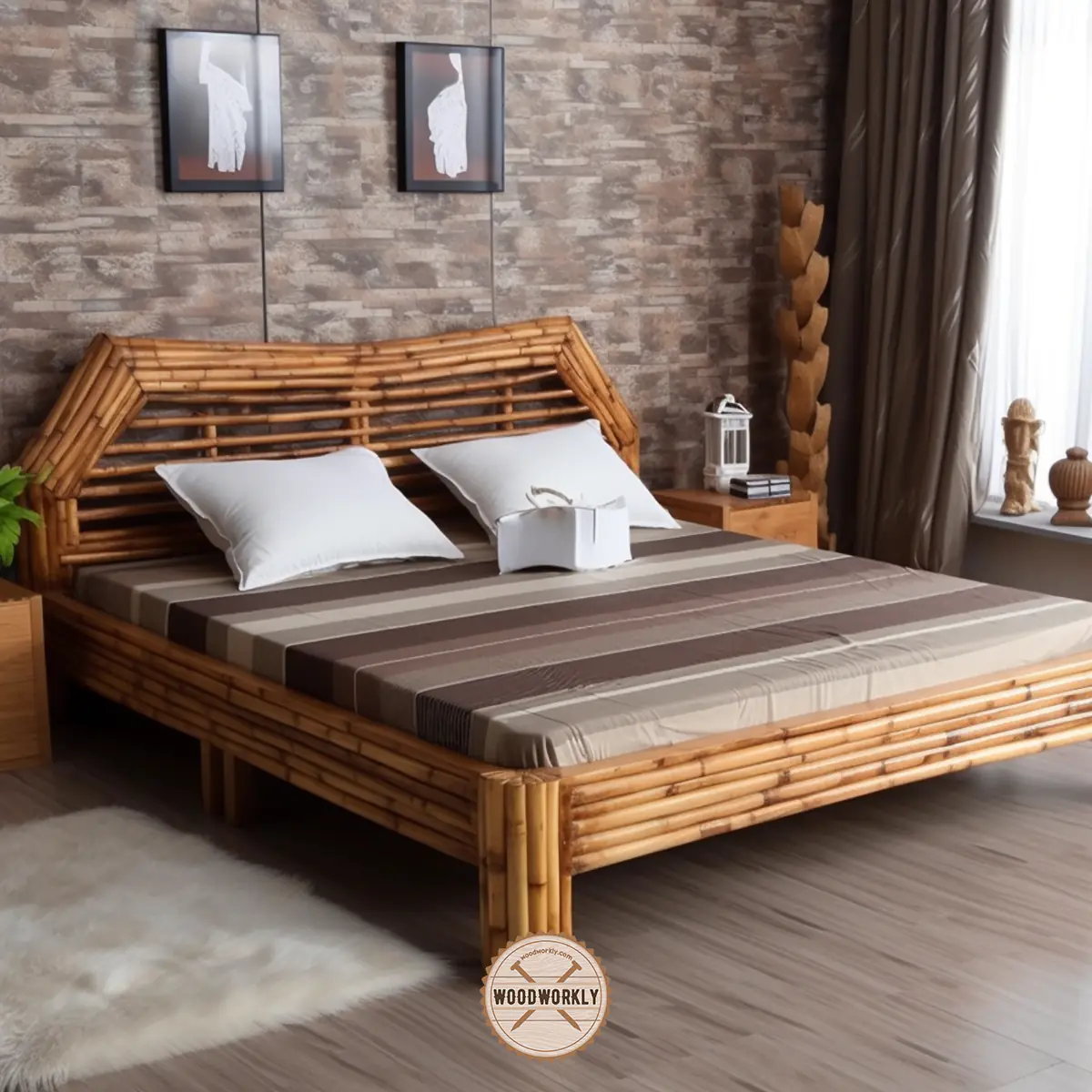
Is Bamboo Strong Enough for Cutting Boards?
Yes, Bamboo is strong enough for cutting boards.
It has significantly high hardness, and high durability, and can withstand sharp knife edges. Bamboo cutting boards are versatile and eco-friendly.
According to the Janka hardness ratings, Janka wood has a hardness rating of 1,410 lbf which is significantly higher than many other kinds of wood that use as cutting boards such as Maple, and Walnut.
But when it comes to porosity, Bamboo wood has huge pores, and food particles and moisture can easily get inside.
So, it’s important to clean Bamboo cutting boards well before and after use because bacteria can grow in those pores structures and make the food unhealthy.
Here’re the pros and cons of Bamboo as a cutting board,
| Pros | Cons |
| Hard and Durable | Porous structure |
| Eco friendly | Won’t harm from knife edges |
| Don’t warp | |
| Strong | |
| Low maintenance |
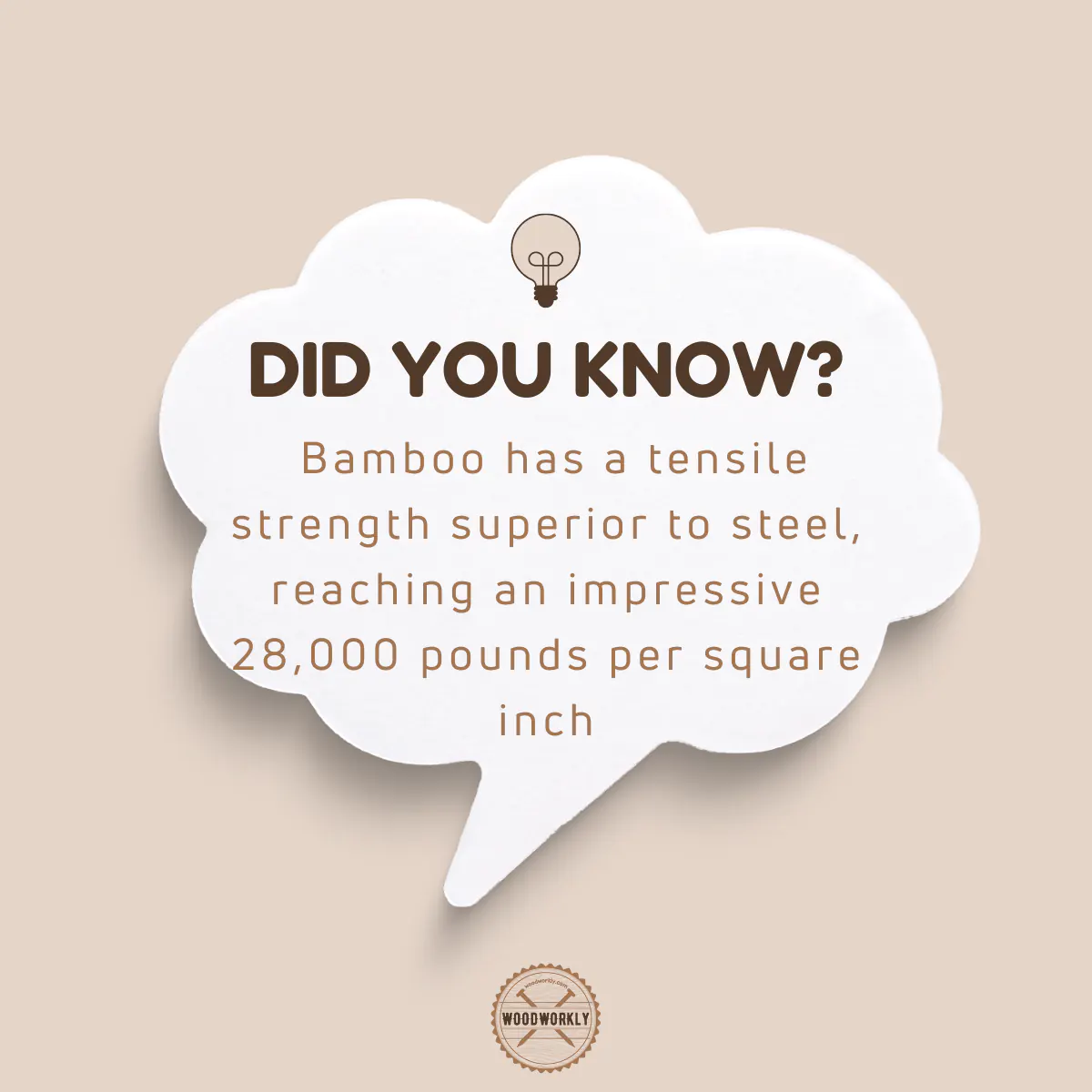
Is Bamboo Stronger Than Steel?
Yes, Bamboo is stronger than steel.
To put it in perspective, steel has a tensile strength of 23,000 pounds per square inch, while bamboo surpasses it with an impressive 28,000 pounds per square inch.
The reason Bamboo is stronger than steel is, because of its great resistance to cracking and splitting. Splitting Bamboo fiber is never easy because it’s stronger than many metals.
Bamboo has a tightly packed fiber molecular structure that increases its strength significantly and its breaking point of fracture is higher than steel.
Therefore, In the construction world, sometimes Bamboo can use as an alternative material for steel. It can use for houses, fences, furniture, and other constructions.
Tensile strength, by the way, is the resistance of a material to breaking under tension.
In simpler terms, if you were to play a game of tug-of-war, you would want bamboo on your team!
Although bamboo may lag a bit behind steel when it comes to compression strength, it still holds its own.
Even more impressive, Bamboo actually performs better than concrete under compression.
The use of steel is costly and it causes environmental and atmospheric pollution.
So, by using affordable, eco-friendly Bamboo instead of steel you’ll be able to get higher strength than steel with environmental protection.
But in terms of durability, Bamboo is susceptible to insect attacks and can cause shrinkages under different environmental changes.
You can minimize those cons by applying a proper sealer. But ultimately in terms of durability, Bamboo can never replace steel.
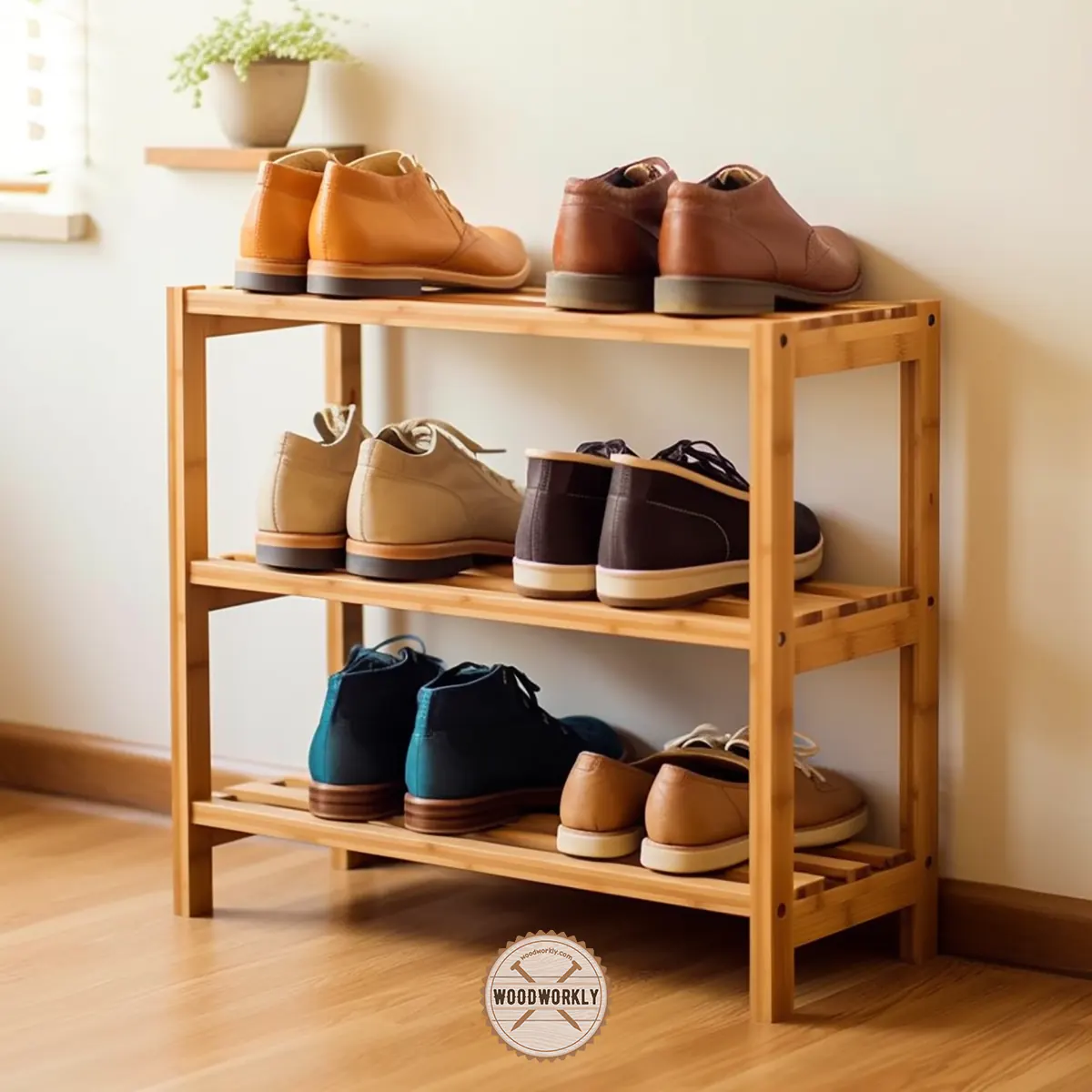
Is Bamboo Stronger Than Wood?
Bamboo is 2-3 times stronger than wood. It can use for any construction project because it has great compressive strength and bending strength and most other woods.
Even though maple is considered one of the hardest and strongest hardwoods on the planet, Bamboo is stronger while being lightweight.
If you like the appearance of Bamboo over any other wood and if you’re good at woodworking and handling Bamboo, better to go for it because, in terms of strength, durability, and dimensional stability, Bamboo is so much better than any other wood.
Is Bamboo Stronger Than Oak?
Yes, Bamboo is stronger than Oak. According to the compressive and tensile test values, the strength of Bamboo and Oakwood is as follows,
| Wood Type | Compressive Strength | Tensile Strength |
| Bamboo | 19.96 Mpa – 23.80 Mpa | 142 Mpa – 265 Mpa |
| Oak | 3.79 Mpa -20.9 Mpa | 5.50 Mpa |
As you can see both compressive strength and tensile strength are significantly higher in Bamboo.
Most importantly, the tensile strength of Bamboo is so much higher than Oak.
Is Bamboo Stronger Than Concrete?
Yes, Bamboo is stronger than a mixture of concrete. The compressive strength of Bamboo is higher than concrete.
Concrete is costly and causes environmental pollution while Bamboo is eco-friendly, affordable, and provides much more strength than concrete does.
Therefore, people tend to use Bamboo over concrete for construction purposes.
But Bamboo is organic, and it rots over time because of water and moisture. Therefore, instead of replacing concrete with Bamboo, engineers use Bamboo to reinforce concrete with a high success rate.
This will make concrete more versatile and stronger.
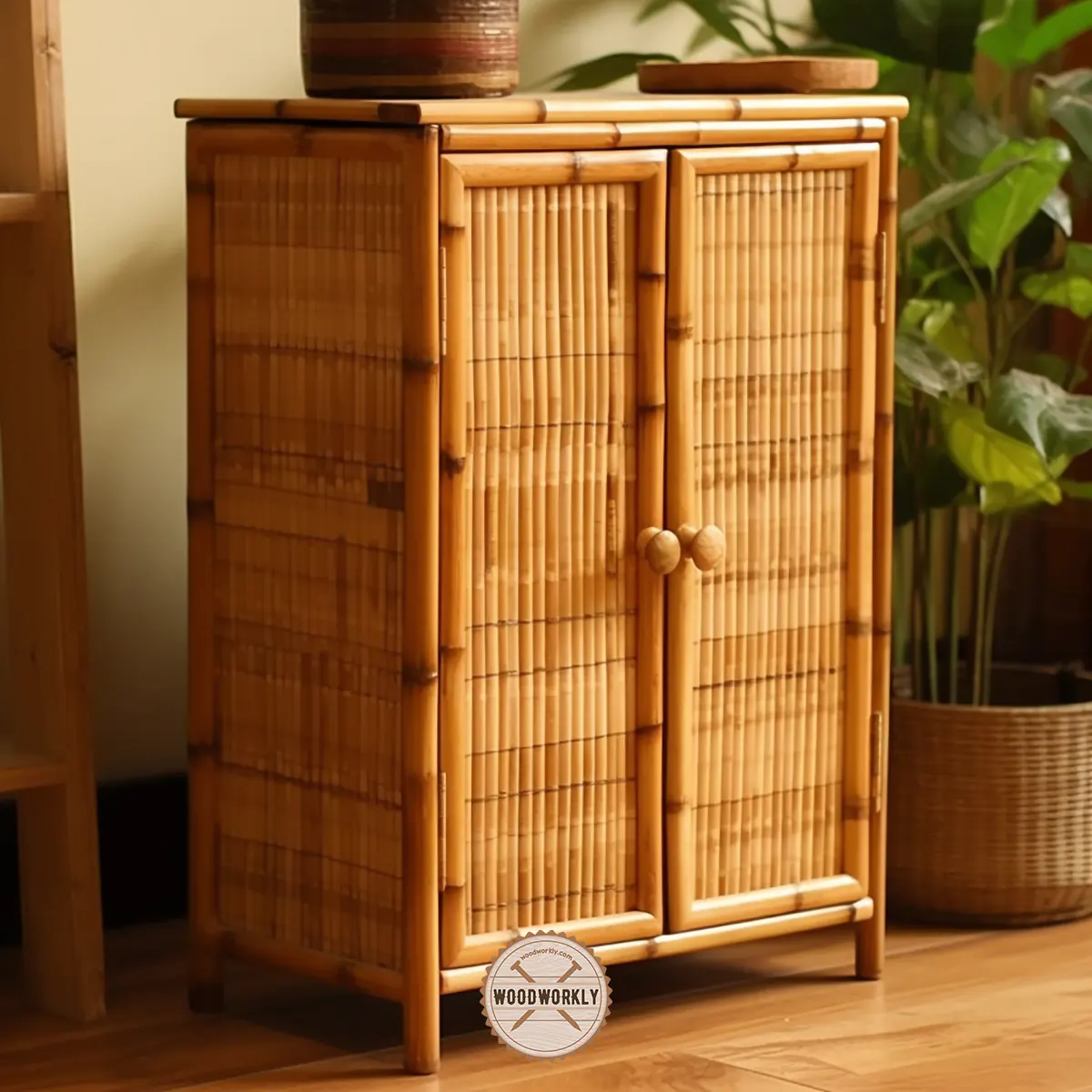
How Hard Is Bamboo?
Bamboo is 2-3 times harder than most woods. It has a hard and dense fiber structure that provides great strength, hardness, and durability.
Janka hardness test is a standard method of measuring the resistance of wood to dents and scratches.
If a particular wood has high resistance against dents and wear, it has a high hardness value.
Likewise, according to the Janka hardness test, Bamboo has a hardness rating of 1,410 lbf which is significantly higher than many other kinds of wood.
Bamboo is harder than Pine, White Oak, Maple, Hickory, Tigerwood, Mahogany, and Cherry.
Basically, Bamboo is harder than any traditional hardwood on the planet.
How Durable Is Bamboo?
Just like we marvel at the strength of bamboo, it’s equally fascinating to delve into the durability of this versatile plant.
Let’s take a closer look at how bamboo measures up in terms of its longevity and resilience in various conditions and uses.
Bamboo’s Incredible Lifespan
Bamboo’s durability can be quite surprising, considering it’s a natural, renewable resource.
Did you know that a bamboo stalk, under the right conditions, can last up to 100 years?
It’s not just about the years, but also how well it retains its strength and other physical properties during this time.
This durability comes from its unique composition, featuring strong, densely packed fibers that resist wear and tear.
Facing the Elements
When we think about durability, we also have to consider how well a material can resist different environmental factors.
In the case of bamboo, it’s naturally resistant to many pests and diseases that can plague other types of wood.
Furthermore, a bamboo’s outer layer has an impermeable protective coating that wards off moisture, enhancing its durability in humid and wet conditions.
However, it’s important to note that bamboo does require proper treatment to enhance its resistance to water and pests, especially in environments that are not native to bamboo growth.
If you need to know how to protect outdoor bamboo furniture, read my latest guide about the best methods to protect your outdoor furniture from the elements.
Bamboo in Everyday Life
Bamboo’s durability shines in its various applications. Let’s take bamboo flooring as an example.
It is well-known for its resilience and ability to withstand high foot traffic.
In fact, it’s often compared to hardwoods like oak, and yet, bamboo typically outperforms them in durability tests.
Bamboo furniture is another area where durability is key.
From chairs to tables to bed frames, bamboo holds up extremely well, showcasing not just its strength but also its longevity.
Sustainability Meets Durability
One of the most appealing aspects of bamboo is that its durability doesn’t come at an environmental cost.
Bamboo can grow to its full size in just a few years, meaning that it can be harvested more frequently than other types of wood, reducing the impact on forests.
As you can see, bamboo is a champion when it comes to durability.
With its impressive lifespan, resilience to environmental factors, and wide range of uses, bamboo not only stands strong but also stands the test of time.
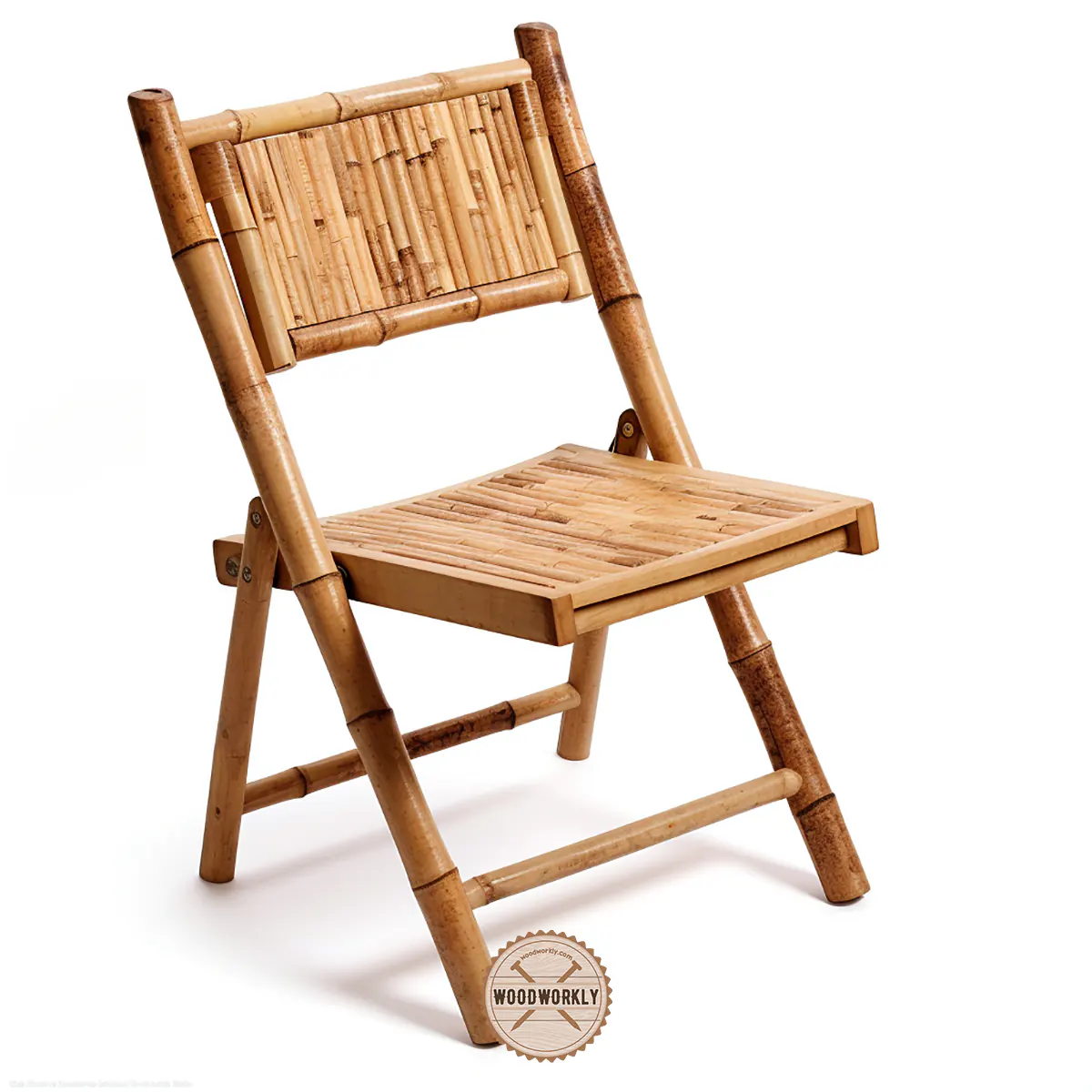
How Sturdy Is Bamboo?
Ah, the sturdiness of bamboo! It’s a topic that sparks quite a discussion among enthusiasts and critics alike.
Sturdiness might seem like a straightforward trait, but when it comes to bamboo, there’s more to it than meets the eye.
So, let’s dive right into it and explore the tenacity and solidity of this remarkable plant.
The Flexibility-Sturdiness Paradox
Here’s a fun fact: bamboo’s sturdiness is somewhat of a paradox. How so, you ask? Well, bamboo is both flexible and sturdy.
You’ve probably seen images of bamboo groves with stalks bending in high winds, seemingly on the verge of snapping, but they rarely do.
This is because bamboo has an impressive tensile strength—higher than that of steel—which means it can withstand a lot of stretching and bending without breaking.
Withstanding Pressure: A Lesson From Bamboo
Bamboo’s sturdiness goes beyond its flexibility. Its ability to withstand pressure, particularly compressive force, is astonishing.
Bamboo’s compressive strength is higher than that of concrete, which explains why it’s often used as a reinforcement material in construction, especially in regions prone to earthquakes.
Despite its lightness compared to steel, bamboo’s weight-to-strength ratio makes it a more efficient choice for construction.
It’s sturdy enough to support structures while also reducing the overall weight of the construction, a critical factor in engineering.
Sturdiness Across Varieties
It’s essential to remember that bamboo is not just a single plant, but a family of over a thousand species.
The sturdiness of bamboo can vary among these species, with some being more robust than others.
For instance, Moso bamboo, used in high-quality bamboo flooring and furniture, is renowned for its exceptional sturdiness.
Sturdiness In Your Home
We see bamboo’s sturdiness in everyday items. Bamboo cutting boards, for instance, can withstand the pressure of sharp knives and heavy pots, and yet they remain relatively unscathed over years of use.
Bamboo furniture, including chairs and tables, offers sturdiness that competes well with traditional hardwood furniture.
Bamboo is undeniably sturdy.
Its ability to withstand both tensile and compressive forces, its resilience across different species, and its practical application in various products all stand as a testament to its robust nature.
That’s it, folks! Now you know everything you need to know about, Is Bamboo strong with its properties.
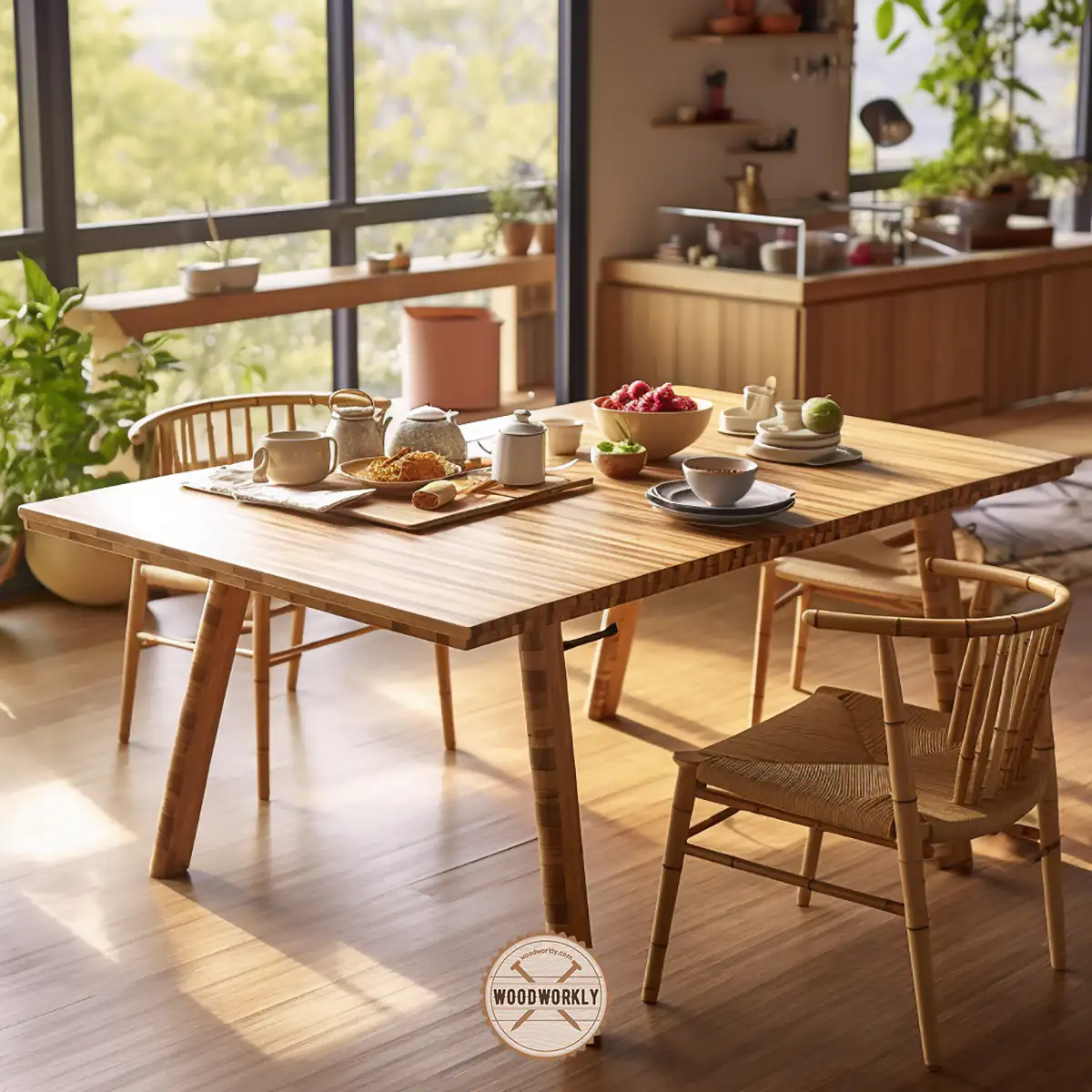
Let’s answer some frequently asked questions.
FAQs
How strong is bamboo compared to steel?
Bamboo surpasses steel when it comes to tensile strength, holding strong at 28,000 pounds per square inch against steel’s 23,000. However, bamboo is weaker than steel in terms of compression.
Is bamboo harder than most hardwoods?
Yes, bamboo is indeed harder than most hardwoods, even outperforming oak by being 2-3 times harder and stronger.
Can bamboo be used for construction?
Yes, bamboo’s excellent strength-to-weight ratio, superior to that of steel, makes it an effective material for construction and reinforcement.
What contributes to the strength of bamboo?
The combination of its high tensile strength, impressive compressive strength, and inherent flexibility all contribute to bamboo’s remarkable strength.
Is the sturdiness of bamboo consistent across all its species?
The sturdiness can vary among bamboo’s over a thousand species, with certain species like Moso bamboo being especially robust.
Does bamboo’s strength translate well into everyday products?
Yes, the durability of bamboo is observable in various products, from bamboo cutting boards resisting sharp knives to sturdy bamboo furniture.
Did I cover all you wanted to know about: Is Bamboo Strong?
In this article, I have deeply discussed, is Bamboo strong and how strong Bamboo is by taking its characteristic qualities over other woods.
I have explained is Bamboo strong for furniture, flooring, and cutting boards and how Bamboo is stronger than steel, concrete, and other woods.
Bamboo is extremely strong. It has higher compressive strength and tensile strength compared to most other woods. Bamboo has a superior strength-to-weight ratio, and structural integrity, and is able to withstand high stress. Because of its great strength, Bamboo is used for furniture, cabinets, flooring, and as a building material.
Furthermore, I have answered some frequently asked questions as well.
Hope you have gained good knowledge about the strength of Bamboo.
Try to build your next woodwork using the Bamboo tree to get more practical knowledge about the wood. practice makes you perfect in woodworking!